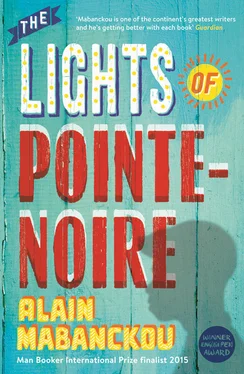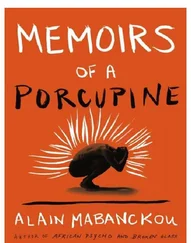Entering the schoolyard, I spare a moment’s thought for that most steadfast witness, Jean Makaya, our ‘corridor supervisor’. He’s departed this world now, the new general supervisor tells me, as he insists on giving me the guided tour of what now seems to me like a labyrinth. We go into his little office just off the main corridor, leading to the schoolyard. He talks about his predecessor, referring to him now and then as ‘the late lamented’, with an air of profound respect. He shows me a press cutting pinned up on the wall, signed by one Pépin Boulou:
‘Do you remember Pépin Boulou?’
I hesitate for a moment, and pretend to be thinking. The general supervisor understands my awkwardness:
‘But of course you do! He often talks to me about you. You were in the same class, in Building A, the literary section, and you both got your bac in literature and philosophy in 1984, I looked it up in the archives when they told me you’d be dropping in today. Ah well, Pépin wasn’t lucky like you, he didn’t get to go to France, he teaches here now. Some people had to stay behind, after all, for the torch to be passed on! It’s a shame he’s on holiday, he’d have been thrilled to see you again…’
I go up to the wall where the article in praise of Dipanda has been posted. I just skim the last paragraph, thinking that in funeral eulogies and tributes of this kind it’s usually the last paragraph that really counts. I’m right, too, as it reads as follows:
1994 was the 40th anniversary of the Victor Augagneur Lycée. This event passed completely unnoticed. What did not pass unnoticed, however, was the retirement of Jean Makaya, alias ‘Dipanda’. A junior supervisor of legendary dynamism, he worked in this lycée from 1960 to 1994. Intransigent, quick to judge a face, hard working to a fault, he carried out his caretaking duties for thirty-four years, a loyal servant both of this lycée and the Congolese state in general. A veritable fossil in our school, the corridor supervisor, dubbed ‘Dipanda’, saw eleven directors come and go, and witnessed the graduation of most of the pupils, a familiar figure to all. Every single pupil could supply one or more colourful anecdotes about him. Born around 1939, his death passed almost unacknowledged in 1998; only four years after he took his retirement. On the 29th July 2002, on the initiative of the present director, Ferdinand Tsondabeka, a lively tribute was paid to him. Since then, Building A, traditionally reserved for the teaching of literature, has been named after him. As that august poet Victor Hugo wrote: ‘in the quiet of his tomb he heard the world speak of him’. At a single stroke, indifference and neglect were set right once and for all.
I try to think of a ‘colourful anecdote’ connected with Dipanda, but none comes immediately to mind. A few snatches maybe, but they are so diffuse that all I can really remember all these years later is a man devoted to his duties, apparently ageless, who loomed over us with a stick in his right hand, which he was happy to use if he thought a pupil was showing disrespect. I can still see him standing outside the gates, checking that our school uniform was clean, properly ironed, and that certain young rascals weren’t fooling about, turning up their collar, or rolling up their sleeves to expose their biceps, as was the habit of some young ‘louts’ from the rough neighbourhoods. At the beginning of each school year, Dipanda brought all the new pupils together in the schoolyard and lectured them for an hour on how lucky they were to be taking their place on the benches of this noble institution:
‘This lycée is a snapshot of the history of this town. Of the whole country, even, the whole of Africa!’
He would then reel off all the names of significant former pupils: prime ministers, army generals, directors of large companies. Not omitting to mention that it was in 1963 that the first female teacher in the Congo, Aimée Mambou Gnali, gave her first lessons:
‘Madame Gnali — what a woman! She arrived three years after I was made supervisor! I helped her a lot, young boys can be dreadful with women!’
Dipanda’s view was like that of many of those sentimentalists who looked upon the Lycée Victor Augagneur of the 1950s as the ‘Lycée Louis-le-Grand’ of the tropics. They would refer to the area around the school as the ‘Latin Quarter’ of the Congo, underlining the extent to which the institution stood for rigour and scrupulousness — in short, was a school where merit alone separated the wheat from the chaff.
We chose to distance ourselves from this rather over-insistent adoration, especially since it came mostly from those who in reality were nostalgic for the colonial school and viewed everything through the prism of the past. So, if a classroom fell into disrepair, you would hear them complaining in the corridors, out of earshot of the principal, Pierre Justin Makosso:
‘It’s all because the blacks are running the lycée now! If the whites were still here they’d have repaired the roof and repainted the walls!’
According to them, Victor Augagneur had been the best school in the world, before the modern era came along and changed everything for the worse. They claimed that the primary school certificate back then was equivalent to the baccalaureate in our day, and the baccalaureate under colonial rule had been easily equivalent to three years’ study at the Marien-Ngouabi University in Brazzaville. There was a general attitude of resignation, which encouraged the previously colonised to imagine that the Negro was essentially lazy, chaotic, careless, and that these shortcomings had undermined the Western way of doing things, which had been guiding our future nations in the right direction.
In their nostalgia they seemed to have forgotten that it was that great colonist Victor Augagneur who, after his promotion to the leadership of French Equatorial Africa, imposed the press-ganging of all able-bodied men living along the construction route of the Congo — Ocean railway line. Over twenty thousand people lost their lives in the gruesome construction of this line, and many more were left mutilated and maimed. One vestige of that peril is a landmark familiar to all Pontenegrins: the station in Pointe-Noire, dreamed up by French architect Jean Philippot, who also designed the station at Deauville, hence the apparent resemblance some have observed between the two buildings.
It would be no exaggeration to say that Victor Augagneur was one of the promoters of a modern form of slavery, which drove people from all over the Congo to leave their land and hide in the bush, to escape what amounted to certain death. Victor Augagneur employed all the means at his disposal to achieve his cherished goal; to make Pointe-Noire into the terminus of the Congo — Ocean network, and hub of the whole of the Middle Congo, of which it would become the capital — thus avoiding any dependence on the part of the French colonial administration on the transport network of the Belgian Congo, with its railway line connecting Matadi to Leopoldville.
In his own lifetime, Victor Augagneur was not privileged to see his name carved atop the main building of the Pontenegrin lycée. The lycée was inaugurated in 1954, two decades after his death. Initially it was called the ‘Classical and Modern Secondary School’. People noticed it didn’t have a real name, and an adjustment was made: ‘Classical and Modern Secondary School Victor Augagneur’. Some people found this a bit excessive. In the end they opted for the more straightforward version: ‘Lycée Victor Augagneur’.
However, the constant changing of titles wasn’t over yet, and Governor Victor Augagneur’s place in posterity was by no means yet secure in the coastal city. The Marxist-Leninist regime of the ‘Immortal’ Marien Ngouabi, who came to power in 1968, would upset things all over again. Indeed, during his reign, there was much talk of ‘independence of spirit’ and solidarity with communist brothers the world over, how the proletariat of all countries must unite for the final struggle. Above all, ‘mental colonisation’ must be wiped out, and the order went out for the systematic clean-up of anything which recalled, dimly or vividly, the domination of the white man, and above all of the new enemy, capitalism and its ideology of exploitation of man by his fellow man. The policy must start at the top, so under Marien Ngouabi the country would be called, not the Republic of Congo, but the ‘People’s Republic of Congo’. Schools, roads, railway stations with colonial names were all gradually rebaptised with the names of Congolese heroes or promoters of communism. The secondary school where I had recently passed my school certificate, or ‘brevet’, was called the Trois Glorieuses secondary school in memory of the three days — 13, 14, 15 August 1963 — during which the Congolese trade unionists and their sympathisers ousted Fulbert Youlou, a polygamous priest of the Roman Catholic church, and first president of our country, who tried to impose a one-party state.
Читать дальше












